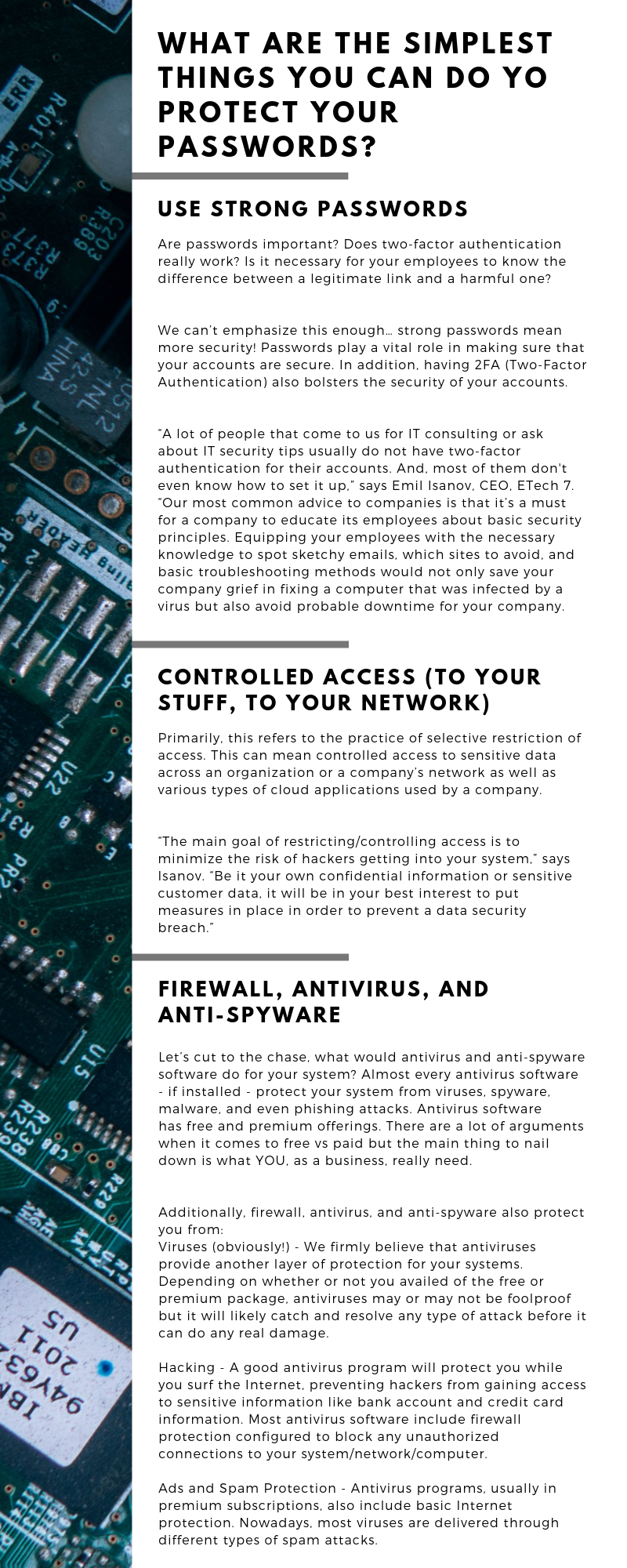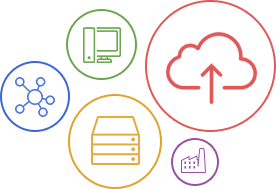
What is Cyber Security?
Whether you're reading this article for personal reasons or for protecting your business, it is important to determine what cyber security is first and what it really does.
Is it here to protect yourself? Your business? Your sensitive data? Your payment information? Your client's personal and financial information?
Why yes... to all of the above!
IT security is, according to this article by Cisco, is “a set of cybersecurity strategies that prevents unauthorized access to organizational assets such as computers, networks, and data. It maintains the integrity and confidentiality of sensitive information, blocking the access of sophisticated hackers.”
If you’re scratching your head, we understand - that was a mouthful. But let us simplify it for you - IT security is, for all intents and purposes, placed to protect your data. Why? Because in today’s world, data is the most important thing your business can have. Every business decision, every financial move is - and always will be - backed up by data.
An important thing to remember is that cyber security threats do not care about age, gender, race, culture, and background - it attacks based on what it might be able to gain from you financially. Based on a Global Risks 2017 report, published by the World Economic Forum, the rise of cyberattacks and major data breaches and hacks have led many countries to adopt security measures and counter-terrorism laws.
We’re not trying to scare you - we just want you to know the reality of the world we’re currently living in. Are you ready in the event of an IT security breach? A malware attack? Or a simple virus scare? What are the basic steps you have to take to ensure that your company has cyber security solutions in place? Having a cyber security policy for small business will go a long way!
Why do you need IT Security?
Chances are your business deals with sensitive information. May it be contact details of your business partners, a database of your clients and their sensitive information - it is important to note that information security has a lot of different facets that may be able to cover all of your business functions. Various types of cyber security services exist but it's up to you to determine what your business needs as each business is unique. There is no one-size-fits-all approach.
Having a holistic approach to securing your infrastructure, your business processes, and your assets should be every single business’ priority - especially nowadays when everything could be wiped out and be taken from your hands in a snap!
The bottom line is that having cyber security solutions for small business in place means safety for your business. In today’s modern world where every business decision is made based on acquired data, it only makes sense to protect it - right?
So what do you need to be wary of?
Most Common Cybersecurity Threats and Cybersecurity Tips for Small Businesses
Password-based attacks
Passwords are used to authenticate the person logging into any account’s identity - and it goes without saying that passwords aren’t really something that you share freely with everyone. However, don’t think that hackers do not have any means of getting your password.
- Password Guessing/Resetting
- This is probably the most common type of password-based attacks. Simply put, what password resetting is that hackers try and guess your password through a manual or automated approach since not all authentication measures are equally effective against guessing attacks. Meanwhile, password resetting refers to another strategy that hackers use through the “Forgot Your Password” measure found in most websites. However, password resetting would only work if the hackers already have access to your email.
- Key Logger/Keystroke Logging Attacks
- This is a type of software that monitors and records each keystroke typed on a computer keyboard. Basically, it logs in everything you type!
“But what if I type for a living? I type thousands of words a day - they would never guess my password!” Well, in a way, you’re right. But unless the words you type everyday use a mix of alphanumeric characters then we’re pretty sure “P4ssWord2!” stands out.
Keyloggers will not only be able to record your passwords but also the people you interact with, payment information (credit card numbers, birthdays, etc), and - essentially - anything you do online.
- Rainbow Tables
- Huh? What are Rainbow Tables? Chances are this is the first time you have heard of it.
Rainbow Tables are usually used by password cracking software for hackers that are interested in invading a company’s network security. In essence, almost all computer systems require password-based require password-based are stored in databases and, more often than not, associated with their respective user accounts.
- Dictionary Attacks
- A dictionary attack is a method used to break through password-based security systems done systematically by entering every word in the dictionary as a password. You’d think that this might be the least effective type of hacking technique, but you’d be surprised by the number of computer users and businesses that insist on using plain dictionary words as passwords.
Viruses
According to Norton, a trusted antivirus software by Symantec, viruses are designed to spread from host to host and has the ability to replicate itself. In more technical terms, a computer virus is a type of malicious code or program written to alter the way a computer operates and is designed to spread from one computer or device to the other.
As technology advances more and more, viruses become trickier and trickier as well. ETech 7, a leading managed IT services provider in New York City, is coming up with an IT security webinar that will go in-depth about viruses like malware, worms, trojans, ransomware, adware, spyware, rootkits, among other things. Subscribe to our blog to get notified!
Phishing
Considered as a cybercrime, phishing is defined as the practice of sending fraudulent emails claiming to be from a reputable source in order to trick computer users into revealing personal information such as passwords, credit card numbers, and other sensitive information.
What are the simplest things you can do to protect your business?

Among many others! ETech 7 has written an in-depth article about information security here: What is IT Security?
Do you need cyber security consulting for your small business?
Again, it depends on what you and your business needs. You might be asking - if it’s as simple as installing an antivirus, doing a quick lecture with my employees, and ensuring that I have antivirus software in place, why should I hire a professional?
Easy. Peace of mind.
Instead of spending your time learning these stuff then educating your employees about the different types of Internet pitfalls, why not just focus on growing your business?
You might be rolling your eyes but please - hear us out!
Managed IT service providers exist to help your business cover your IT needs which, in turn, allow businesses to lower costs and become more effective in its day-to-day operations. Top cybersecurity companies offer services may vary from server management, customer support, server backup, to - you guessed it - network security.
And, as we’ve talked about before, data is king in today’s world. Almost every single business decision now relies on acquired data. That’s where we, as managed IT service providers, come in.
“Managed IT service providers oversee large data centers and put multiple layers of protection in place,” says Isanov. “However, users may still be breached by hackers. It is of utmost importance to understand that as technology improves, the type of attacks become more intricate as well. All hope is not lost though - as long as each security layer is kept up to date, we would be able to see attacks from a mile away.”
Still unconvinced? Or do you want to know more about how you could better protect your business? ETech 7 offers a free network check for your business!












